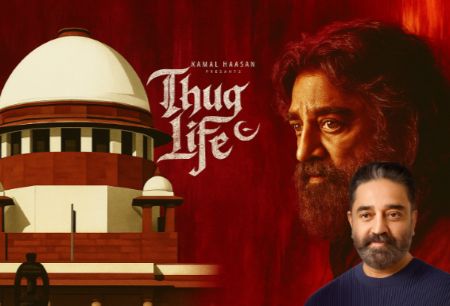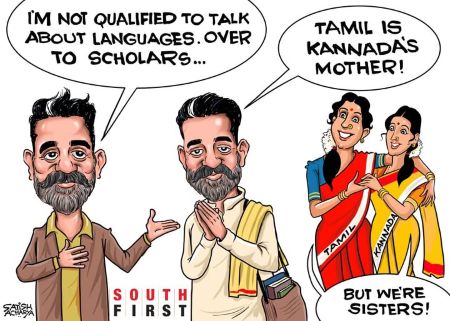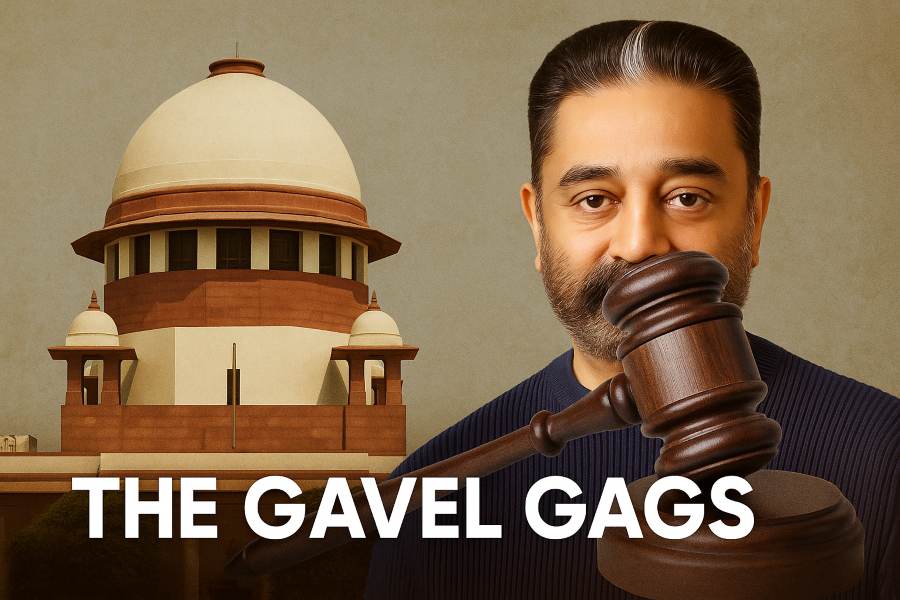Kamal Haasan gets SC support, but past gag orders expose judicial contradictions.
THE SUPREME COURT has rightly questioned the directions given by a judge of the Karnataka High Court in a case involving freedom of speech and expression. The case pertains to a statement by thespian Kamal Haasan, who had merely said that the Kannada language was born out of Tamil.
This statement triggered widespread protests in Karnataka, with some leaders threatening to burn down theatres screening Kamal Haasan’s latest film, Thug Life.

Haasan’s petition in the High Court was dismissed by Justice M. Nagaprasanna, who demanded an apology from the actor for his remarks and stated that “no citizen has the right to hurt sentiments.”
The court observed that Haasan could have issued a clarification, saying, “I have made a statement without looking into the history,” and added, “One apology would have solved everything… but look at the attitude!”
Justice Nagaprasanna further questioned Haasan’s claim: “The circumstances were created by Kamal Haasan, and he has said he will not apologise? You have undermined the sentiment of the people of Karnataka… On what basis? Are you a historian? Or a linguist?”
The court also criticised the actor’s request for police protection despite allegedly having caused the unrest. “Now you are here for a commercial interest, asking for police protection for a situation created by you,” the judge remarked.
 Following Kamal Haasan’s refusal to apologise, the film was not released in Karnataka, prompting the filing of a Public Interest Litigation (PIL) in the Supreme Court.
Following Kamal Haasan’s refusal to apologise, the film was not released in Karnataka, prompting the filing of a Public Interest Litigation (PIL) in the Supreme Court.
A bench comprising Justices Ujjal Bhuyan and Manmohan remarked that the rule of law cannot be held hostage to mob threats, and warned that “groups of hooligans” cannot be allowed to decide what gets screened in theatres.
“If someone has made a statement, you counter it with another statement. You cannot threaten to burn down theatres,” the bench said.
The Supreme Court transferred the plea filed by the film’s producer from the Karnataka High Court to itself and asked the state government to file its reply. It also questioned the role of the High Court, particularly its suggestion that the actor should apologise to resolve the issue. The apex court stated that asking someone to apologise for their remarks is not the role of the judiciary.
The highest court itself has imposed gag orders in several cases involving free speech.
It emphasised that once a film is cleared by the Central Board of Film Certification (CBFC), it must be allowed to be released. “People can choose not to watch it, but we cannot allow threats and intimidation to determine whether a film is released,” the court added.
The court also cited past judgments, including the Bombay High Court verdict in the Mi Nathuram Boltoy play case and the Imran Pratapgarhi ruling, to support the view that differing opinions must be protected in a democracy.

However, it must be pointed out that the courts—including the Supreme Court—have on occasion issued contradictory rulings on the vital issue of freedom of speech and expression, which is enshrined in the fundamental rights under our Constitution. The highest court itself has imposed gag orders in several cases involving free speech.
In February this year, while granting interim protection from arrest to podcaster and influencer Ranveer Allahbadia, the Supreme Court imposed a gag order barring him from posting on social media. This decision was widely seen as contradicting previous rulings by the Court that cautioned against excessive restrictions on speech.
Ranveer had faced intense criticism for one of his shows, which was deemed neither humorous nor entertaining, but rather perverse. Multiple FIRs were filed against him across the country, and there were widespread calls for his arrest.
He approached the apex court, citing threats to his life. While the court granted him protection from arrest and clubbed the FIRs, it also barred him from releasing further podcasts until further orders.
India’s highest court must speak in one voice on free speech—and ensure all courts follow.
This gag order drew criticism from media and civil society organisations, who argued that the court had sought to muzzle the very freedom of speech it is meant to uphold.
 Ironically, the same court had earlier refused to prohibit Alt News co-founder Mohammed Zubair from tweeting while on bail, stating that such a restriction would amount to an unjustified violation of free speech. In that judgment, the court explicitly said that “gag orders have a chilling effect on the freedom of speech.”
Ironically, the same court had earlier refused to prohibit Alt News co-founder Mohammed Zubair from tweeting while on bail, stating that such a restriction would amount to an unjustified violation of free speech. In that judgment, the court explicitly said that “gag orders have a chilling effect on the freedom of speech.”
Yet, in another order, the Supreme Court imposed a gag on journalists, preventing them from reporting on a case filed by the Andhra Pradesh Anti-Corruption Bureau against high-profile individuals.
The Supreme Court, as the final frontier for safeguarding the fundamental rights of citizens, must issue clear and consistent guidelines on the subject—guidelines that should be uniformly followed by High Courts and the subordinate judiciary. ![]()
________
Also Read:
How Iran Was Duped by Israel
Disclaimer : PunjabTodayNews.com and other platforms of the Punjab Today group strive to include views and opinions from across the entire spectrum, but by no means do we agree with everything we publish. Our efforts and editorial choices consistently underscore our authors’ right to the freedom of speech. However, it should be clear to all readers that individual authors are responsible for the information, ideas or opinions in their articles, and very often, these do not reflect the views of PunjabTodayNews.com or other platforms of the group. Punjab Today does not assume any responsibility or liability for the views of authors whose work appears here.
Punjab Today believes in serious, engaging, narrative journalism at a time when mainstream media houses seem to have given up on long-form writing and news television has blurred or altogether erased the lines between news and slapstick entertainment. We at Punjab Today believe that readers such as yourself appreciate cerebral journalism, and would like you to hold us against the best international industry standards. Brickbats are welcome even more than bouquets, though an occasional pat on the back is always encouraging. Good journalism can be a lifeline in these uncertain times worldwide. You can support us in myriad ways. To begin with, by spreading word about us and forwarding this reportage. Stay engaged.
— Team PT

